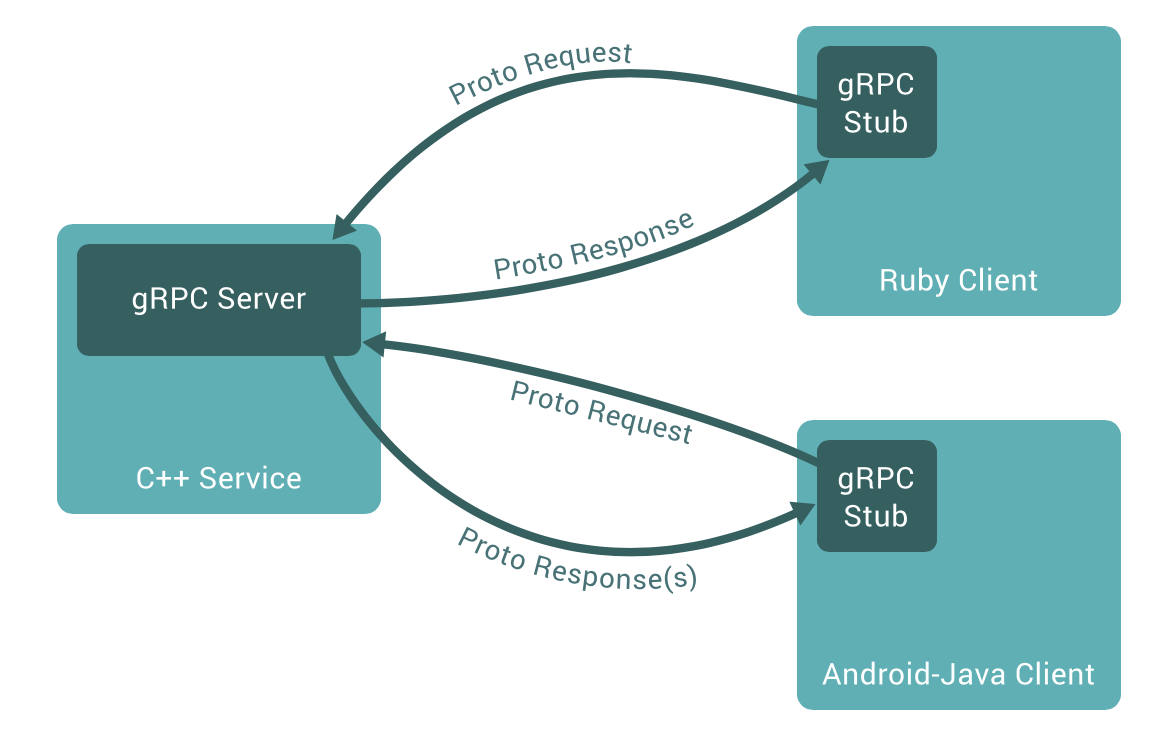因为不同的业务场景,异构的业务系统十分常见。异构服务之间的同步通信方式的选择不外乎 HTTP 和 RPC 两种。RPC 方式可以像调用本地方法一样调用远程服务提供的方法,对客户端来说具体实现完全是透明的,服务之间的通信会变得更容易。
对于 RPC 框架的选择,gRPC 当前已经是首先:
gRPC是一个高性能、通用的开源RPC框架,其由Google主要面向移动应用开发并基于HTTP/2协议标准而设计,基于ProtoBuf(Protocol Buffers)序列化协议开发,且支持众多开发语言。
在这里我们以我们实际业务场景 Python 服务和 Go 服务之间的交互来介绍一下 gRPC 的使用。
Python gRPC
- python 环境
这里可以使用
virtualenv 来初始化一个干净的 Python 环境
1
2
3
4
|
pip3 install virtualenv
# 使用 python3.7 创建虚拟环境
virtualenv --python=python3.7 venv
source venv/bin/activate
|
- gRPC 依赖
1
2
3
4
|
# grpcio 是启动 gRPC 服务的项目依赖
pip install grpcio
# gPRC tools 包含 protocol buffer 编译器和用于从 .proto 文件生成服务端和客户端代码的插件
pip install grpcio-tools
|
- 定义 proto 文件
1
2
3
4
5
6
7
8
9
10
11
12
13
14
15
16
17
18
19
20
21
22
23
24
25
26
27
28
29
30
31
32
|
syntax = "proto3";
import "google/protobuf/empty.proto";
// service 关键字定义提供的服务
service MyService {
// 定义一个探活方法
rpc Health (.google.protobuf.Empty) returns (.google.protobuf.Empty){
}
// 定义一个批量查询 user 的方法
rpc User (UserReq) returns (UserReply){
}
}
// message 关键字定义交互的数据结构
message UserReq {
repeated int32 userIDs= 1;
}
message UserReply {
string message = 1;
// repeated 定义一个数组
repeated User data = 2;
}
message User {
string name = 1;
int32 age = 2;
string email = 3;
}
|
- 生成代码
1
2
3
|
# 使用 protoc 和相应的插件可以编译生成对应语言的代码
# -I 指定 import 路径,可以指定多个 -I 参数,编译时按顺序查找,不指定默认当前目录
python -m grpc_tools.protoc -I ./ --python_out=. --grpc_python_out=. ./api.proto
|
经过上述步骤,我们生成了这样两个文件
api_pb2.py 此文件包含每个 message 生成一个含有静态描述符的模块,,该模块与一个元类(metaclass)在运行时(runtime)被用来创建所需的Python数据访问类
api_pb2_grpc.py 此文件包含生成的 客户端(MyServiceStub)和服务端 (MyServiceServicer)的类。
- 实现服务端
1
2
3
4
5
6
7
8
9
10
11
12
13
14
15
16
17
18
19
20
21
22
23
24
25
26
27
28
29
30
31
32
33
34
35
36
|
#!/usr/bin/env python3
# -*- coding: utf-8 -*-
import logging
from concurrent import futures
import grpc
from api import api_pb2_grpc, api_pb2
from api.api_pb2_grpc import MyServiceServicer
from service import get_users
class Service(MyServiceServicer):
def Health(self, request, context):
return
def User(self, request, context):
print('start to process request...')
res = get_users(request.userIDs)
users = []
for u in res:
users.append(api_pb2.User(name=u['name'], age=u['age'], email=u['email']))
return api_pb2.UserReply(message='success', data=users)
def serve():
print('start grpc server====>')
server = grpc.server(futures.ThreadPoolExecutor(max_workers=10))
api_pb2_grpc.add_MyServiceServicer_to_server(Service(), server)
server.add_insecure_port('[::]:50051')
server.start()
server.wait_for_termination()
if __name__ == '__main__':
logging.basicConfig()
serve()
|
到此,如果我们用 Python 客户端当然也能请求到服务端。因为我们这里介绍的是 Go 和 Python 的交互,这里就不 demo 了。
Go gRPC
我们这里 Go 服务作为客户端调用 Python 服务,同样需要根据 proto 文件生成代码,进而创建客户端发起 RPC。
- go gRPC 依赖
1
2
3
4
5
6
7
8
|
# 安装 ptotobuf, 推荐使用 brew
brew install protobuf
# protoc go 插件安装
go get -u github.com/golang/protobuf/protoc-gen-go
# 这里安装在 GOPATH 下的 bin 目录,所以保证这个目录在 $PATH 中
export PATH="$PATH:$(go env GOPATH)/bin"
# 代码 gprc 依赖安装
go get -u google.golang.org/grpc
|
-
生成 Go pb 代码
protoc -I ./ --go_out=plugins=grpc:./ api.proto
-
客户端调用
1
2
3
4
5
6
7
8
9
10
11
12
13
14
15
16
17
18
19
20
21
22
23
24
25
26
27
28
29
30
31
32
33
|
package main
import (
"context"
"fmt"
"log"
"time"
"ginDemo/api"
"google.golang.org/grpc"
)
const (
address = "localhost:50051"
defaultName = "world"
)
func main() {
conn, err := grpc.Dial(address, grpc.WithInsecure(), grpc.WithBlock())
if err != nil {
log.Fatalf("did not connect: %v", err)
}
defer conn.Close()
c := api.NewMyServiceClient(conn)
ctx, cancel := context.WithTimeout(context.Background(), time.Second)
defer cancel()
r, err := c.User(ctx, &api.UserReq{UserIDs: []int32{1, 2}})
if err != nil {
log.Fatalf("could not greet: %v", err)
}
fmt.Printf("gprc result: %+v", r.Data)
}
|
Python 服务端输出示例

Go 客户端输出示例

以 Python 服务和 Go 服务之间的 gRPC 通信就说到这里,希望对想使用 gRPC 的同学带来参考和启示。



